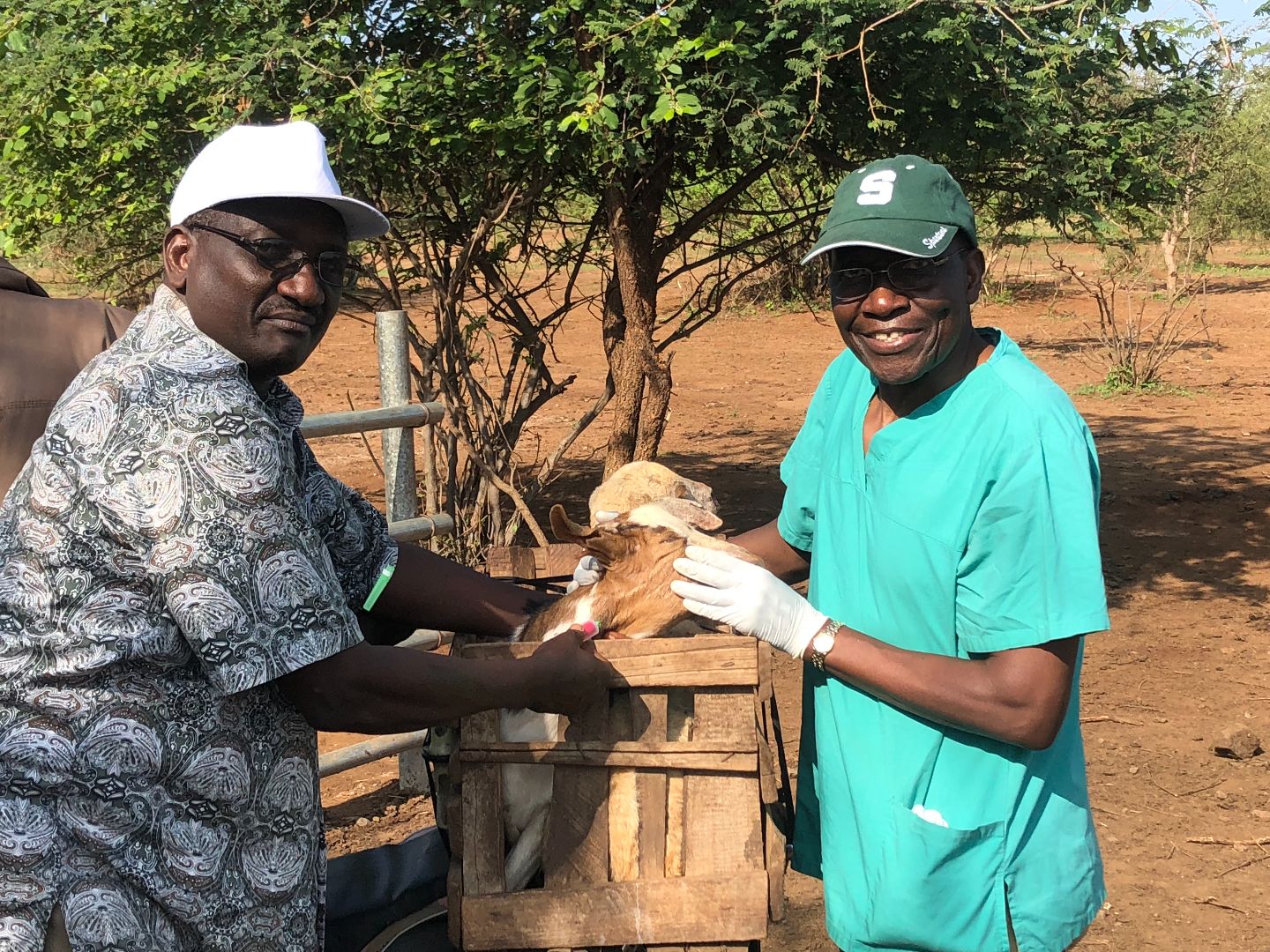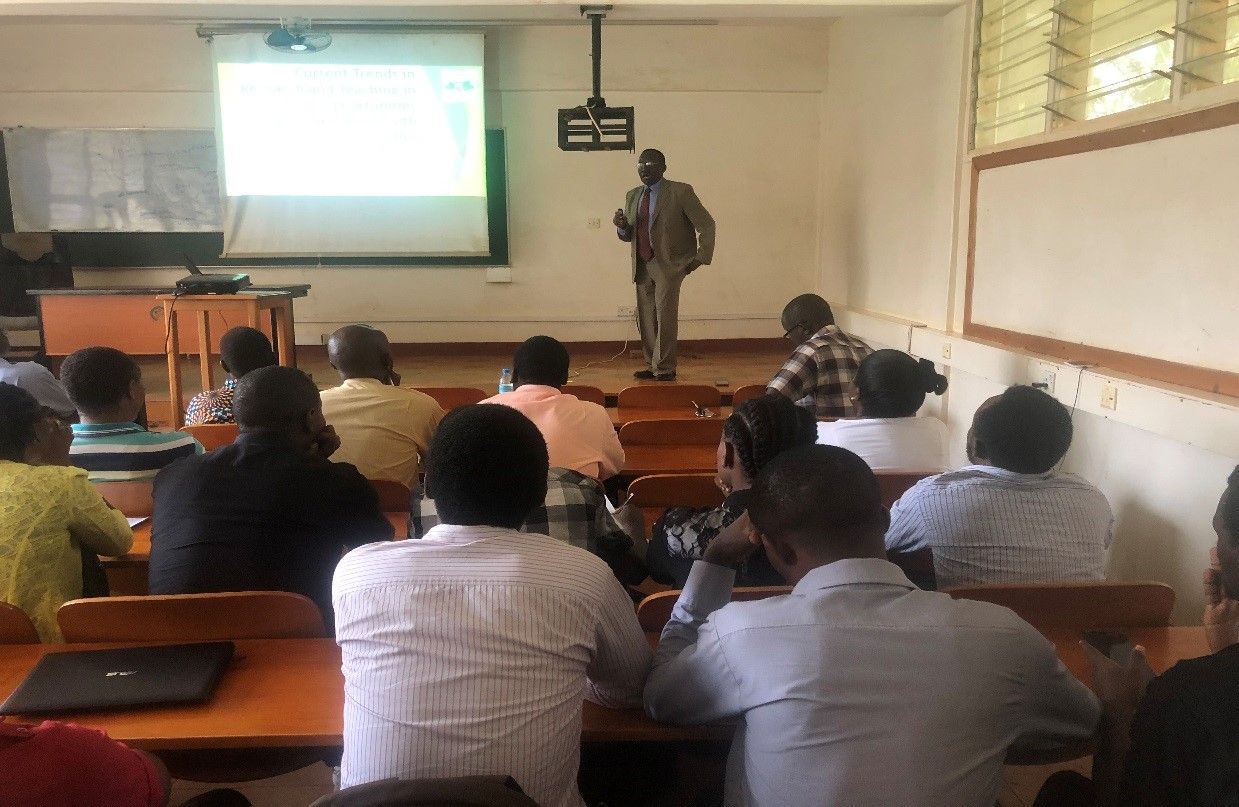From growing up on a farm to becoming a University Distinguished Professor of Epidemiology and Public Health, as well as the Director of the Center for Comparative Epidemiology at Michigan State University, John B. Kaneene set for himself a remarkable journey. This journey includes 40 years of building a variety of international research and training programs in countries around the world making him a model recipient of the Charles A. Gliozzo International Award for Public Diplomacy.
Kaneene developed these programs as regional exchanges so that students and faculty from MSU may interact with their counterparts not just in one country at a time, but with peers from several countries within a region during a multi-year exchange. At the same time, Kaneene has built the institutional capacity of these programs to sustain the research and teaching done during the exchanges. In the process, Kaneene has strengthened African universities by investing his own time and effort, teaching young scholars and preparing them to support their own institution.
Kaneene has also co-lead the steering committee responsible for the Year of Global Africa at Michigan State University in 2018 and 2019, helping provide seed money for faculty and graduate students working on interdisciplinary research and teaching projects related to Africa and the African diaspora. Kaneene’s research focuses on zoonotic diseases as well as antibiotic resistance, food safety, TB/HIV co-infections, disease transmission at the human-livestock-wildlife interface, effects of climate change and building evidence-based development programs.
Being brought up on a dairy farm in Uganda was the foundation for my wanting to understand the struggles that people go through in low-income countries. My struggle to go to school was real, and sometimes I wonder how I made it. So my experience made me see that there is a lack of simple information to increase people's health and economic well-being. That was always in the back of my mind as I went through the ladder of education.
I studied veterinary medicine because I was influenced by a veterinarian who used to come and treat our cattle, goats, sheep and chickens. And I thought, “Well, a veterinarian can treat so many animals! I want to become one like that.” So I was really touched and influenced by the art and science this veterinarian demonstrated.
In regards to epidemiology, at the farm we had this problem called foot-and-mouth disease that affects animals such as cattle, goats, sheep and pigs. And I remember one day my father stood there near a farm and said, “How does it travel? Is it through air? Through the river’s water? Where does it hide? I wish some scientists could carry out detective work to help us. All of a sudden, cattle get sick. I wish I could find out.” Later on, I had an instructor who described epidemiologists as disease detectives. So that linked with what my father had said. That was the real backbone of my interest in epidemiology—we try to find out where diseases come from, where they are going and how we can prevent them.
I would group this into two parts. One is training programs in different countries. I have been very fortunate to train people here at MSU and in their countries who have become outstanding leaders and scientists.. I'll give one example: I spent eight years in Thailand doing research with students. One of my Ph.D. students, who came to MSU and then went back, is now the head of the United Nations Food and Agriculture Organization in the Eastern Asian region. He is stationed in Vietnam and is doing marvelous and important work. But I've got others in different countries who are now lecturers, professors and some who are government ministers. I'm very, very proud to train the next generation.
The other type of impact I’m proud of has to do with economic well-being. One example is in Uganda, where we were funded by the Gates Foundation to help women to improve their economic well-being. We help them produce better, safer and higher quality milk. In addition, we told them how to do what is called value added and they started making yogurt. Long story short, starting from a very poor community, those women organized as a group and now they're manufacturing yogurt for sale. Once the manufacturing was in place, we got them money from the World Bank.
The most moving part about this is when women presented their accomplishments and said “now I can send my kid to school” or something similar. It is so touching that there are no dry eyes in the room when we are presenting. We show all kinds of data, standard deviations, and so forth but those don’t make much difference. When the women stand up and talk about how much this means to them, it is very impactful.
That's another area where I'm so excited about what happened. It started when I was in high school back in Uganda. President Kennedy had launched the Peace Corps and we had Americans come to our schools, and they were extremely courteous and very curious. They wanted to find out about our food, they wanted to know how it was made, and wanted to taste everything. They wanted to know about our traditional religions and would listen to what people have been doing for centuries. If there's anything that I think had a very big impact on my coming to the United States, it is the Peace Corps.
When I came to Michigan State, my first project was to work in Sudan which is primarily a Muslim country. And I remembered the lessons from those days in high school with the Americans. I would listen to people, be curious, respect their religion, first ask about their way of doing things, and I knew how using their words matters. In Sudan, I would go to their mosque and colleagues would ask me “are you Muslim?” And I answered, “No, I'm not. But they have invited me.”
Another example is my work in Thailand. I paid attention and there are things you don't want to speak against in Thailand. One is their king. Their king is everywhere. Even in theatres, when you start, there's a picture of the king and everybody has to stand. That's their culture. Don't question that. Another thing you don’t question is their religion. They're Buddhists. And also you don’t question their love for their language and food. Then, when we went to Thailand with my students, I taught them how we need to behave. And these students and our program ended up being very popular.
Then there is my visit to the Amazon in Brazil. People there were very surprised that I do not speak Portuguese, but I was so interested in the way the natives make their own food in the Amazon, how they predict time, what kind of medicine they use. If your wife is pregnant, what do you use? I showed a lot of interest and, according to my Ph.D. student, they shared with me things that they have never taught most people. So respecting the culture and showing interest are the best tools for diplomacy.

I look at it as a two-way street. Number one, if you have faculty and staff from MSU who go to these countries like many of us have done, you have an opportunity to appreciate the differences, the strengths and cultural traits. So, when students come here, you're more likely to understand their struggles. I have brought two Thai students every year for the last 20 years, and once they come, I know exactly what kind of food they want and it is very easy for me to entertain them. And it's not a surprise that every year we are ranked one of the top universities for international students coming because we create a good environment for them. I think the faculty environment is welcoming, and I attribute that to the many faculty and staff having the opportunity to visit these countries.
The second aspect of this international education done well is the long term payoff of going to many countries and bringing students here. As a result of those exchanges, the MSU name is known everywhere. I haven’t been to a single country where the MSU name is unknown. When faculty write international grants from various funding sources to work on problems in those countries, it is reasonably easy to get collaborators from those countries to work together. This gives MSU a huge advantage over other institutions that do not have the global network we have.
This year has been a tough one. Let me start with Brazil as an example. We were supposed to work on a disease called tuberculosis (TB). It's a mega-disease and, especially for patients with HIV, it really becomes a problem. So, Paolo Carneiro, my Ph.D. student, is working on TB in Amazonas, Brazil, to get samples processed and go back and forth. I like my students to do the coursework here, and then to do the research in their country addressing a specific problem. However, because of COVID, we could not get the samples; we couldn't get to any lab. Thanks to our diplomacy and the relationships we built, we have been able to bypass all those blocks and get to colleagues there that I've worked with. To get this project going, we went all the way up to the federal government in Brazil, got additional funding, and obtained permissions to send DNA samples to be processed in highly modern facilities in Brazil. We also continue our programs in Uganda, Tanzania and Kenya. They were going to stop because of the pandemic but, again with the diplomatic foundation that we have, I was able to negotiate and those programs live on. Not at full speed, but they will survive.
The Charles A. Gliozzo International Award for Public Diplomacy recognizes an individual who has made significant contributions to public diplomacy through educating, training or promoting knowledge and understanding between MSU faculty and staff, community members and international students, scholars and visitors. Awardees are those who have demonstrated a commitment to promote and enrich international educational exchanges and cultural exchanges within the greater MSU community.